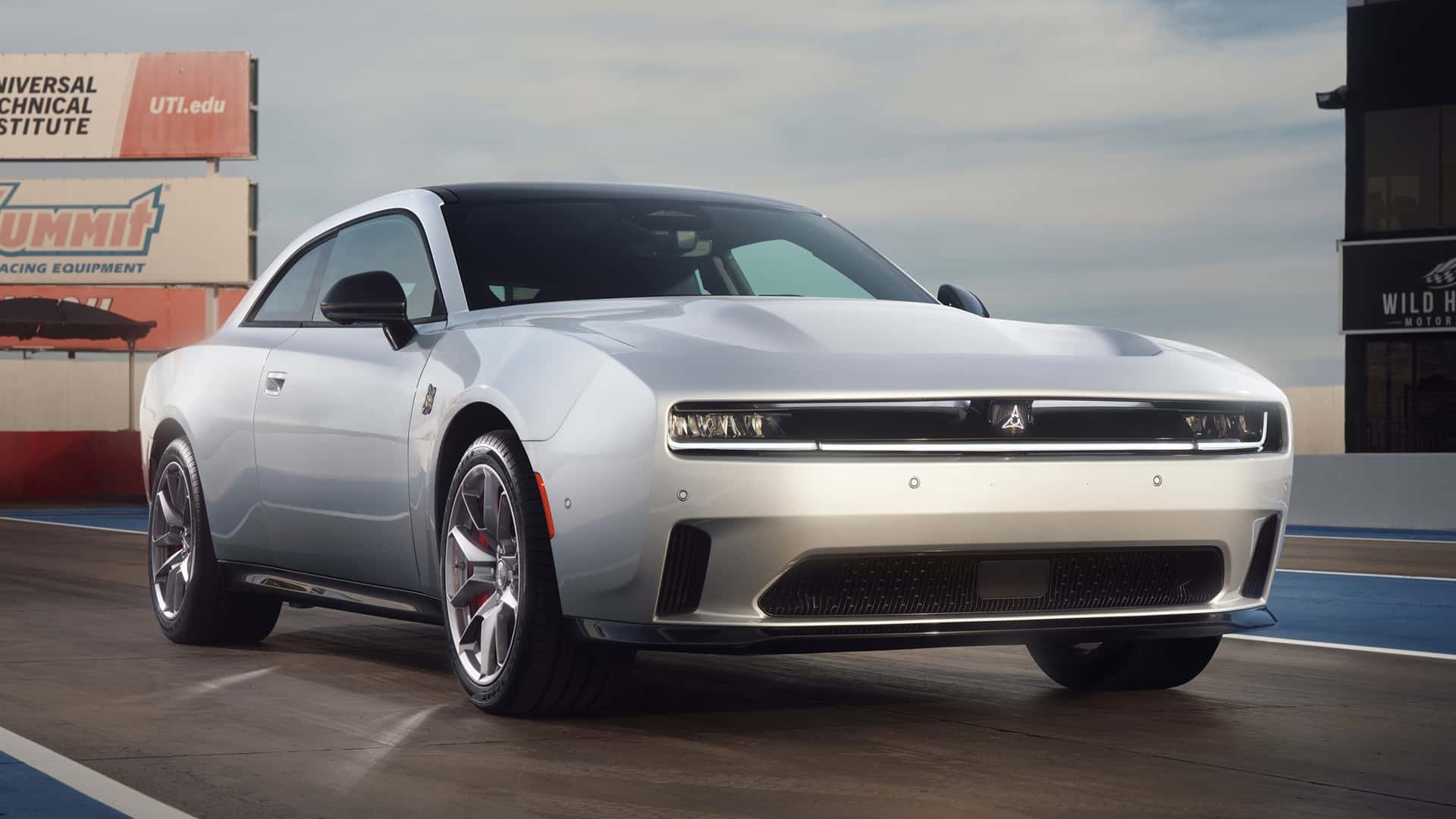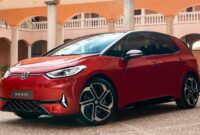The next-generation Dodge Charger is here, and the rumors were true. Electric and combustion-powered Chargers will coexist going forward. Electric models are all Charger Daytonas, while gas Chargers get “Sixpack” branding. But Dodge doesn’t want buyers to see electric or gas cars here. In the eyes of Dodge CEO Tim Kuniskis, the new Charger is a muscle car regardless of how the power is made.
He makes a compelling case. When 2024 Dodge Charger Daytona production begins this year, the least powerful version will have up to 496 horsepower. There’s also a 670-hp version, each sending power to all four wheels. The ICE Charger is also AWD, entering production next year with 420 hp or 550 hp. At launch, the fastest Charger Daytona reaches 60 mph in 3.3 seconds and goes 11.5 seconds in the quarter-mile. Dodge claims the new Charger Daytona is the quickest and most powerful muscle car in the world — barring the bonkers 800-volt Banshee that comes next year.



Charger Daytona Deep Dive
The 2024 Dodge Charger Daytona launches in two trims: R/T and Scat Pack. Both have a 400-volt architecture and share the same dual-motor layout, powered by a 100.5-kilowatt-hour battery pack with a discharge rate of 550 kilowatts. R/T is the starter trim, with Scat Pack serving as the range-topper for now. It’s the first vehicle to ride on Stellantis’ STLA Large platform, and with all the EV components plugged in, Dodge says the Charger Daytona has a near 50/50 weight distribution.
Dodge says the new Daytona weighs 5,838 pounds, making old Charger seem positively light by comparison. To help manage the heft, Dodge gives the Daytona the largest tire package ever offered on a factory Charger. Scat Pack trims with the Track Package get 20-inch wheels wearing 305/35-series tires in front and 325s on the back. Behind those front wheels are 16-inch Brembo brakes with six-piston calipers. All Charger Daytonas get a mechanical limited-slip differential in its rear electric drive module (EDM), too.
At the front, the EDM has a wheel end disconnect designed to improve range and efficiency. Dodge says the R/T has a range of 317 miles, while the Scat Pack and its extra horsepower manage 260 miles between charges. Juicing up on a 350 kW fast charger can refill range from 20 percent to 80 percent in approximately 27 minutes.
The Scat Pack is what you’ll need to reach 60 mph in 3.3 seconds and run the 11.5-second quarter mile. The R/T trails at 4.7 and 13.1 seconds, but it’s actually a bit faster overall. Stay on the throttle and the R/T will top out at 137 mph, versus 134 mph in the Scat Pack. Each has one variable-ratio gear, though Kuniskis says a dual-speed setup is coming for the Banshee.


The Charger Daytona rides on a multi-link front suspension with an independent rear setup. Dual valve semi-active suspension with adaptive dampers is optional on the Scat Pack with the Track Package, and in this case, track doesn’t simply mean drag strips. A new race prep system is designed to give the battery a colder starting temperature, allowing drivers to turn more laps before heat becomes an issue. There’s a slightly different prep system for quarter-mile racers, and you can even engage line lock to heat up the rear tires before launching. Or, you can nix all of that and get sideways with Donut or Drift Mode.
Variable Horsepower
Here’s where the caveats come in. The Charger Daytona Scat Pack launches with 670 peak hp and 627 pound-feet of torque, whereas the R/T has 496 hp and 404 lb-ft. However, those numbers are achieved only when pressing the “PowerShot” button on the steering wheel while at full throttle. Doing so adds a 40-hp boost from the electric motors for 15 seconds, not unlike a nitrous-oxide system on a gas-powered car. After each press, you have to wait 30 seconds before you can grab another 40-hp punch from the drivetrain. Without PowerShot, the Charger Daytona Scat Pack has 630 hp while the R/T goes down to 456 hp. But wait, there’s more.
For 2024, the Charger Daytona is only available with Dodge Direct Connection upgrade kits already installed from the factory. The R/T gets a Stage 1 kit that adds 40 hp over stock, so basic math tells us it generates 416 hp in standard guise without the PowerShoot figured in. The Scat Pack has a Stage 2 kit that adds 80 hp, so it falls to 550 hp before the PowerShot. We asked Dodge for some clarification about the power figures; a spokesperson explained that the maximum ratings always include the PowerShot boost, and for 2025 the upgrade kits won’t be standard. Take that as you will.


Regardless of the power, you’ll hear the Charger Daytona thanks to its Fratzonic Chambered Exhaust, which is basically speakers in a special exhaust-like chamber. Dodge says the car has the same decibel level as a Hellcat, but as for the nature of the sound, it’s still a mystery because Dodge hasn’t finalized it yet.
Two Doors Or Four Doors
With the STLA Large platform underneath the Charger Daytona’s skin, it should come as no surprise this isn’t a small car. The new Daytona is 17 feet long and nearly 7 feet wide, whether it has two doors or four. It’s also a liftback, with the large gate opening to reveal 22.7 cubic feet of cargo space. Fold the rear seats and space goes up to 37.3 cubic feet – certainly not bad for a performance car, but still a few cubes away from the Dodge Hornet. What the Hornet doesn’t have is a frunk, where you’ll find an additional 1.5 cubic feet of storage for the Charger Daytona.
And yes, the Charger four-door lives on in the new generation. Dodge tells us there are no notable changes between the coupe and sedan save for the doors. Rear seat passengers have 36.9 inches of headroom and 37.2 inches of legroom, though things do feel a bit snug with a traditional transmission tunnel bisecting the cabin. The STLA Large platform is designed to accommodate a variety of gas and electric powertrains, after all.



Attitude Interior, Concept Exterior
When Dodge debuted the Charger Daytona SRT EV concept, it was billed as a near-production design. In fact, Kuniskis says it pretty much was the final design, save for minor changes here and there. That includes the “R” Wing at the front, forming a pass-through for air to go over the grille and hood. The side mirrors have a traditional shape, but the rest of the Charger’s body mirrors the concept. That includes the Fratzog logo in the grille, which may or may not replace the current Dodge double-stripe logo.
The Charger’s interior is decidedly digital, but it doesn’t lack analog-style swagger. The driver gets a standard 10.25-inch digital screen or an optional 16-inch unit, working with a 12.3-inch center screen. The lines of the dashboard evoke those from the 1968 Charger, with a pistol-grip shift handle holding station in the center console. Up high, an optional full-length glass roof gives light to the interior, or, if you want something more colorful, Dodge’s “Attitude Adjustment” interior lighting offers a range of 64 colors. These can change depending on what you’re doing, such as opening a door or pushing the start button.

Depending on the package and options, interior layouts range from cloth and vinyl seats to Nappa leather on high-backed buckets. In the tech department, you’ll find an optional heads-up display and Dodge’s Uconnect 5 system offering TomTom navigation, Amazon Alexa compatibility, and more. There are a plethora of standard driver assists including forward collision alert with automatic braking, adaptive cruise control, traffic sign recognition, lane-keep assist, blind spot detection, and drowsy driver detection.
The Internal Combustion Charger
Dodge isn’t ready to spill many details on the next-gen gas-powered Charger, set to arrive in 2025. Called the Charger Sixpack, the automaker confirmed it’ll ride on the same STLA Large platform, though it will feature some minor styling differences. The sole engine is the twin-turbocharged 3.0-liter Hurricane straight-six already offered in Jeep and Ram vehicles, making either 420 or 550 hp. To those holding out hope for a Hemi V-8 amid the electric revolution, it’s time to say goodbye. We asked Kuniskis directly about it, and he confirmed there is no V-8 in the plan.

80 Photos
Pricing And Production
The Charger Daytona R/T and Scat Pack will launch this summer in two-door guise as 2024 models. Four-door models won’t arrive until the first quarter of 2025, which is also when the straight-six-powered Charger Sixpack will enter production. Pricing information isn’t available yet, but with the outgoing Charger R/T notching around $45,000, we suspect the new Daytona R/T will likely start well over $50,000.




